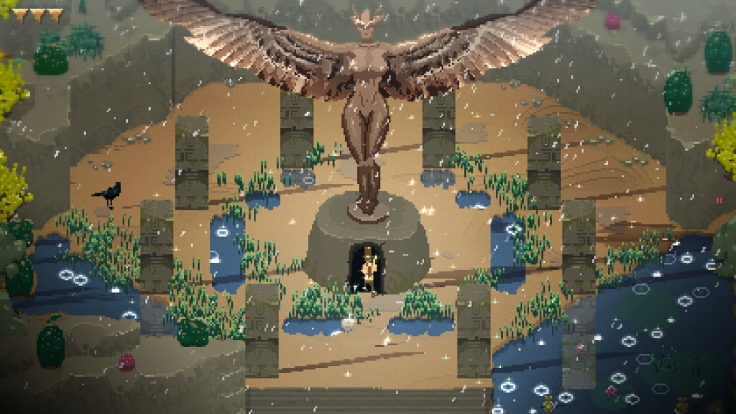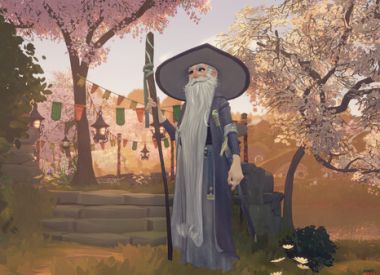You know the kind of game that you mean to pick up for an hour or so before bed, then all of a sudden realize that it’s 3 a.m. and you’ve got work the next day? Songbringer, the procedurally-generated action RPG from Oakland-based indie dev Wizard Fu Games, is just that kind of animal. We got to spend a little hands-on time with Songbringer at E3 in Los Angeles, and our brief demo left us wanting more.
You take the role of Roq, who’s cruising through the galaxy with his robot bud Jib aboard the ship Songbringer. That is, until something goes horribly wrong and you end up marooned on a mysterious planet, having crashed your sweet-ass motorbike. You’ve got to make your way back to the Songbringer, armed with your trusty nanosword and little else, though you’ll be able to acquire seven classes of weapons and hundreds of unique items -- some of which can be combined for interesting effects.
Jib trails along by your side, scanning enemies and sussing out the area for valuable goodies. A second player can control Jib as a support character for local co-op play, potentially a fun way to share the experience with a younger or less-experienced gamer.
Controls are intuitive if you’re familiar with the basics of the genre: you can slash your sword, toss your top hat like a boomerang, drop bombs and phase over short distances. Each of these abilities can be enhanced or modified as you progress throughout the game and discover new items. Roq’s top hat is one such example. You can eventually acquire the ability to imbue the hat with the ice element, allowing you to freeze otherwise impassable bodies of water and temporarily immobilize enemies.
Meditation brings another unique aspect to the game. If you opt to give Roq a calm moment and step back from whacking the crap out of the local wildlife, you can discover hidden paths, items and other loot more combat-minded players might otherwise miss.
But what truly makes Songbringer stand out is the the potential for a completely unique experience every time you play, if you want it. To start the game, you enter a six-letter world seed code, allowing you to explore hundreds of millions of unique environment combinations. If you don’t have a code, or just want to try something at random, the game can pick one for you. (There aren’t any special worlds accessed by entering dirty words, yet, but there are some secret worlds accessible only via code.)
Entering the same seed will always allow you to re-enter the same world, and a standard playthrough (if such an adjective applies) lasts somewhere between six and 12 hours, on average. Progress comes from discovering new items which enhance Roq’s abilities and allow him to access new areas. You can have three different save files, and the progress made within an individual seed saves automatically. The possibility of sharing your randomly generated world with other players opens up some intriguing possibilities for the community, as well.
Having played a brief demo, I can’t yet speak to how well the procedural generation pans out over multiple hours of gameplay, but I was immediately endeared by the game’s 8-bit throwback visual style. While frequently described as a sci-fi Zelda-like, Songbringer has a vibe all its own. The distinctive pixel art will zap you right in the nostalgia zones, and the distinctive aesthetic of the game blends spacey neons with RPG staples like swords, slimes and monsters. It looks like a older game, but depth of detail and nimble controls keep things grounded in modern precision. If you’re getting your ass handed to you by a gaggle of enemies or bumble into a flaming projectile, it’s nobody’s fault but your own. There’s no blaming that sticky NES D-pad this time around.
I was also struck by how much there was to do and explore in my procedurally generated world. I navigated through a forest to get to one of the game’s 10 dungeons. (The dungeons are the same in each world, but will be encountered in random order and will demand different approaches, depending on your arsenal.) As I made my way to and through the dungeon, I kept wistfully noting that there were tons of other branching paths and unique obstacles to explore. What happens when I can blow that up? What will I find when I’m able to freeze that water and go across there? This is a game that invites you at every turn to get lost in the journey.
I’ve mentioned a few older games as points of reference in talking about Songbringer, but my brief experience the game never felt in any way derivative. This is definitely a game with it’s own distinct gameplay quirks and thematic point of view.
If you’re a fan of old-school 2D games like the original Legend of Zelda or Secret of Mana, Songbringer is a charming indie that’s definitely worth keeping on your radar. There’s no firm release date just yet, but it’s slated to come out later this year on Steam (PC, Mac, Linux), PlayStation 4 and Xbox One. Check out the trailer below.


















